What are the Types of Property Developers?
Property development is a multi-faceted industry, encompassing various types of developers who each bring unique capabilities and focus areas to building and transforming real estate.
Understanding these different types of property developers is crucial in business continuity management (BCM), as each type faces distinct risks and continuity needs based on its specific operational models and project scopes.
 From residential to commercial and industrial
From residential to commercial and industrial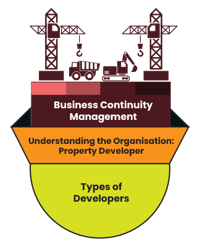 developers, each category involves unique planning, financial investments, and regulatory compliance challenges that BCM strategies must address to ensure smooth project execution and risk mitigation.
developers, each category involves unique planning, financial investments, and regulatory compliance challenges that BCM strategies must address to ensure smooth project execution and risk mitigation.
For instance, residential property developers focus on creating homes, apartments, and other residential spaces, often dealing with complex timelines, buyer financing, and regulatory standards related to housing.
Conversely, commercial property developers work on projects like office buildings, retail centres, and mixed-use developments that require close collaboration with business tenants, municipalities, and investors.
These developers must also consider factors like tenant turnover, commercial lease agreements, and market demand shifts, all of which can influence their business continuity needs. Industrial developers add to the diversity, handling projects such as warehouses, factories, and distribution centres with specific operational requirements and zoning regulations.
For a BCM project, tailoring strategies to each developer type's unique operational risks ensures that their critical business functions remain resilient in the face of disruptions.
For example, a commercial developer might prioritise tenant communication and lease management, while an industrial developer might focus on maintaining supply chain continuity and compliance with stringent industrial standards.
By recognising these differences, property developers can better safeguard their projects, protect stakeholder interests, and reinforce their capability to navigate challenges in an increasingly complex market landscape.
Property developers are classified into various types, depending on the focus of their projects and the nature of the developments they undertake.
Here are the main types of property developers:
1. Residential Developers
- Focus: Develop housing projects such as single-family homes, apartments, condominiums, townhouses, and residential communities.
- Example Projects: Suburban housing estates, high-rise apartment buildings, and luxury villas.
- Target Market: Homebuyers, investors, and renters.
2. Commercial Developers
- Focus: Develop commercial properties, including office buildings, retail centres, shopping malls, hotels, and restaurants.
- Example Projects: Office parks, mixed-use buildings with shops and offices, or malls.
- Target Market: Businesses, retail chains, and service providers.
3. Industrial Developers
- Focus: Develop industrial properties such as warehouses, manufacturing facilities, logistics hubs, and distribution centres.
- Example Projects: Large-scale industrial parks, logistics warehouses, and manufacturing plants.
- Target Market: Manufacturing companies, e-commerce businesses, and logistics providers.
4. Mixed-Use Developers
- Focus: Develop projects that combine multiple uses, typically residential, commercial, and sometimes industrial, within a single development.
- Example Projects: A single development that includes retail stores, office spaces, and residential units.
- Target Market: A combination of residents, businesses, and commercial tenants.
5. Retail Developers
- Focus: Specialize in developing retail spaces, such as shopping malls, strip malls, and stand-alone retail outlets.
- Example Projects: Large-scale shopping malls, retail parks, and outlet centres.
- Target Market: Retailers looking for physical store spaces, from large chains to small independent shops.
6. Sustainable or Green Developers
- Focus: These developers emphasise eco-friendly and sustainable construction practices and materials. They work on projects that meet environmental standards.
- Example Projects: Energy-efficient buildings, zero-carbon developments, and eco-friendly housing communities.
- Target Market: Environmentally-conscious buyers, businesses, and governments.
7. Public Sector or Government Developers
- Focus: Develop infrastructure and real estate for public use, including affordable housing, government buildings, schools, hospitals, and public transport facilities.
- Example Projects: Affordable housing complexes, government office buildings, and public hospitals.
- Target Market: Local communities, government agencies, and non-profit organisations.
8. Specialty Developers
- Focus: Focus on niche markets or specialised types of real estate development, such as senior housing, healthcare facilities, student accommodation, or resorts.
- Example Projects: Retirement communities, assisted living facilities, student housing, and vacation resorts.
- Target Market: Seniors, students, healthcare providers, and tourism companies.
9. Land Developers
- Focus: Specialise in acquiring raw land and preparing it for construction by zoning, subdividing, and installing infrastructure like roads and utilities. They may then sell this prepared land to other developers.
- Example Projects: Master-planned communities, prepared lots for residential or commercial use.
- Target Market: Other developers, real estate investors, and local governments.
10. Real Estate Investment Trust (REIT) Developers
- Focus: Develop properties owned by investment trusts that own and manage income-generating real estate.
- Example Projects: Large-scale commercial developments, residential apartment blocks, or mixed-use projects.
- Target Market: Investors and shareholders of REITs, which manage properties for long-term income generation.
Each property developer caters to specific markets and industries, from residential housing to commercial retail to specialised properties like healthcare facilities or eco-friendly developments.
Summing Up ...
Understanding the different types of property developers is essential for implementing effective BCM strategies. Residential, commercial, and industrial property developers each have unique operational focuses and face specific risks based on their project types.
Residential developers primarily work on housing projects, which require attention to regulatory compliance, financing, and buyer demand. Commercial developers focus on office buildings, retail spaces, and mixed-use developments, balancing tenant needs with market demand. Industrial developers handle projects like warehouses and factories and deal with zoning regulations and operational requirements that impact project timelines and resource management.
These distinctions are vital for a BCM project, as each type of developer must prioritise different continuity measures. Residential developers might emphasise regulatory compliance and financing continuity, while commercial developers focus on tenant communication and lease agreements. Industrial developers, meanwhile, must manage supply chain stability and compliance with industrial standards.
Tailoring BCM strategies to each developer type ensures critical business functions remain operational in disruptions, minimising project delays and financial losses while upholding client and stakeholder trust.
Understanding Business Continuity Management for Property Developers |
|||
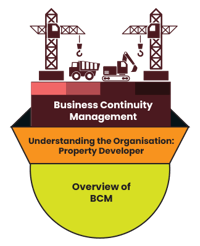 |
 |
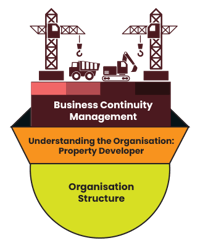 |
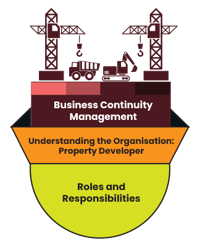 |
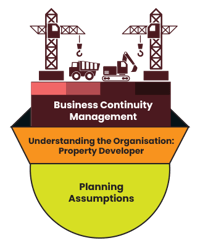 |
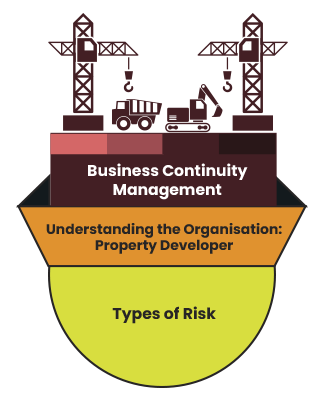 |
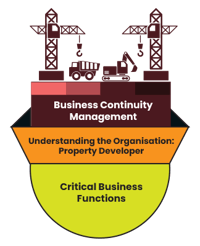 |
|
More Information About Business Continuity Management Courses

 To learn more about the course and schedule, click the buttons below for the BCM-300 Business Continuity Management Implementer [B-3] course and the BCM-5000 Business Continuity Management Expert Implementer [B-5].
To learn more about the course and schedule, click the buttons below for the BCM-300 Business Continuity Management Implementer [B-3] course and the BCM-5000 Business Continuity Management Expert Implementer [B-5].
![Register [BL-B-3]*](https://no-cache.hubspot.com/cta/default/3893111/ac6cf073-4cdd-4541-91ed-889f731d5076.png) |
 |
 |
 |
 |
 |
![FAQ [BL-B-3]](https://no-cache.hubspot.com/cta/default/3893111/b3824ba1-7aa1-4eb6-bef8-94f57121c5ae.png) |
If you have any questions, click to contact us.
|
 |
 |
 |
 |


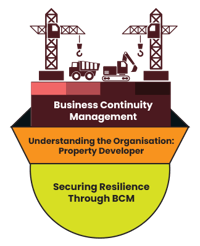
![Email to Sales Team [BCM Institute]](https://no-cache.hubspot.com/cta/default/3893111/3c53daeb-2836-4843-b0e0-645baee2ab9e.png)

